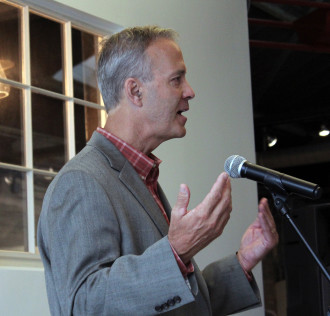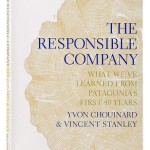Asheville is known for many things, but high-powered morning business events don’t usually top the list. Even restaurant owners and other night-owl local entrepreneurs can turn out early, however, when a not-to-be-missed business luminary comes to town. An eager audience gathered to hear outdoor outfitter Patagonia’s long-time executive and chief storyteller Vincent Stanley speak at 8 a.m. on Sept. 3 downtown.
“What you have here is special and worth protecting,” Stanley said of the local business climate. “I gravitate to places where business people are working together to build strong communities. I’m not sure if you’re even aware of it here, but I can feel it. And this is rarer than you think. It’s not present in a lot of places.”
Sponsored by the Asheville Chamber and the UNCA Family Business Forum, Stanley’s talk traced the evolution of Patagonia’s commitment to environmental and social sustainability, and explored how the lessons of Patagonia’s journey could be applied to challenges facing businesses in Asheville and Western North Carolina.
Stanley, who has worked at Patagonia since the early 1970s, said he has been guided by a quote from conservationist Aldo Leopold: “A thing is right when it tends to preserve the integrity, stability, and beauty of the biotic community.” While this insight may strike many as intuitively correct, noted Stanley, business inherently disrupts and erodes the biotic community.
Patagonia first confronted this paradox in 1972 with one of its first technical breakthroughs, a hard steel piton used to anchor climbing ropes to rock faces. Unlike earlier pitons made from softer metals, Patagonia’s version could be removed and reused multiple times. This advantage helped the fledgling company gain a big share of the U.S. market in climbing hardware. Soon the company realized, however, that its innovation was enlarging cracks in rock faces and destroying the natural resource on which the sport of rock climbing depended.
In a ’70s-era business culture with “no conception of business responsibility to the environment,” according to Stanley, Patagonia reversed course and sent out a 12-page catalog and instruction manual urging customers to use a less-damaging product and methodology for securing ropes to rock faces in many situations. From this experience, Patagonia learned that the company could identify a problem and make a positive change while continuing to operate a successful business.
That learning lay dormant for 15 years as Patagonia shifted its focus toward outdoor apparel. In the late 1980s, the company launched a Boston retail store. “We renovated the space and it was beautiful,” recalled Stanley. “Three days after we opened, employees started calling in sick.”
The culprit? Formaldehyde fumes wafting from stacks of Patagonia cotton clothing stored in the shop’s basement. Probing the impact of cotton farming and textile production eventually led the company to switch to organic cotton, far in advance of customer demand for more sustainable fabrics. The seeds of the decision had been planted 15 years earlier with Patagonia’s shift away from its signature hard steel piton. “That created the cultural memory” to embrace a dramatic move to benefit the environment, Stanley said.
One trend Stanley sees now is a reaction against a “monoculture” of national chain stores. In response to many customers’ disillusionment with big box retailers, he said, regional businesses are investing in new product development and successfully tapping into new markets.
Stanley urged Asheville companies to compete with confidence against lower-quality, less-sustainable products. “At Patagonia, we have a lot of customers who are not rich, people who save up to buy our products,” he said. “Someone who has been disappointed in cheap crap can be a great customer for you.”
Stanley said Patagonia doesn’t see a conflict between business success and its goal of inspiring other companies to bring about a positive benefit to the environment. “We have to be successful and financially healthy to play that role,” he commented.
Patagonia is a B-corp, or benefit corporation, a type of corporate entity recognized in 28 U.S. states (but not yet in North Carolina) that includes in its legally-defined goals a positive impact on society and the environment in addition to profit. This form of incorporation differs in purpose, accountability and transparency from other structures, but not in taxation. As a family-owned business, Patagonia adopted the B-corp structure to ensure that the company will remain committed to social and environmental goals through any future ownership transitions.
Matt Raker, director of community investments for Mountain BizWorks, wanted to know who at Patagonia is tasked with promoting the company’s commitment to environmental stewardship. The company has deliberately kept its environmental department small, Stanley replied, to encourage each of Patagonia’s 2,000 employees to incorporate an environmental ethic into their work and the products they design and manufacture. “We didn’t want the environmental piece to be marginalized and separated out,” he said.
Another audience member asked Stanley for his thoughts on the future of U.S. manufacturing. “In the early days of Patagonia,” Stanley recalled, “about half of our clothes were made in North Carolina.” The company publicly opposed GATT (the General Agreements on Tariffs and Trade) and NAFTA (the North American Free Trade Agreement) before their passage in 1994, which Stanley believes negatively affected American manufacturing. At some point, Stanley predicts, automation will bring textile manufacturing back to the U.S., but without creating a large number of jobs.
Responding to kudos for Patagonia’s initiative to encourage customers to buy its gear second-hand through the company’s eBay store and other sources, Stanley said this move reflects a maturing of the “reduce, reuse, recycle” mantra over time. A number of years ago, the company started sending worn-out clothing to Japan to be melted down and spun into new fiber. Next, a focus on mending still-usable clothing led to the creation of the country’s largest garment repair center in Reno, Nevada. Most recently, Patagonia has encouraged customers to buy less. On Black Friday in 2011, the outfitter placed a full-page ad in The New York Times which read, “Don’t buy this jacket,” alongside the retailer’s R2 coat. The ad copy explained how the R2 — and everything else Patagonia makes — is bad for the environment.
“Our sales didn’t suffer,” said Stanley, “and we got a lot of attention.” A lot of people are sick of consumerism and shopping for entertainment, he continued: “They like the Patagonia clothes that they’ve had for a long time.”
Danna Smith, executive director and founder of local nonprofit the Dogwood Alliance, thanked Stanley for Patagonia’s support of her organization through grant funding over the past 20 years. Stanley said Patagonia commits 1 percent of its sales to nonprofits that “no other foundation would touch.” The company’s $20 Million and Change program, a fund to help start-up companies bring about positive benefit to the environment, is another example of the outfitter’s philanthropy.
Asheville bookseller Malaprop’s was on hand with copies of The Responsible Company: What We’ve Learned from Patagonia’s First 40 Years, co-authored by Yvon Chouiunard and Stanley in 2012. Many attendees left with autographed copies of the book.
Krull & Company posted this video of the event.
This article was originally published on Sept. 6, 2015. It has been updated with the video coverage.







Before you comment
The comments section is here to provide a platform for civil dialogue on the issues we face together as a local community. Xpress is committed to offering this platform for all voices, but when the tone of the discussion gets nasty or strays off topic, we believe many people choose not to participate. Xpress editors are determined to moderate comments to ensure a constructive interchange is maintained. All comments judged not to be in keeping with the spirit of civil discourse will be removed and repeat violators will be banned. See here for our terms of service. Thank you for being part of this effort to promote respectful discussion.